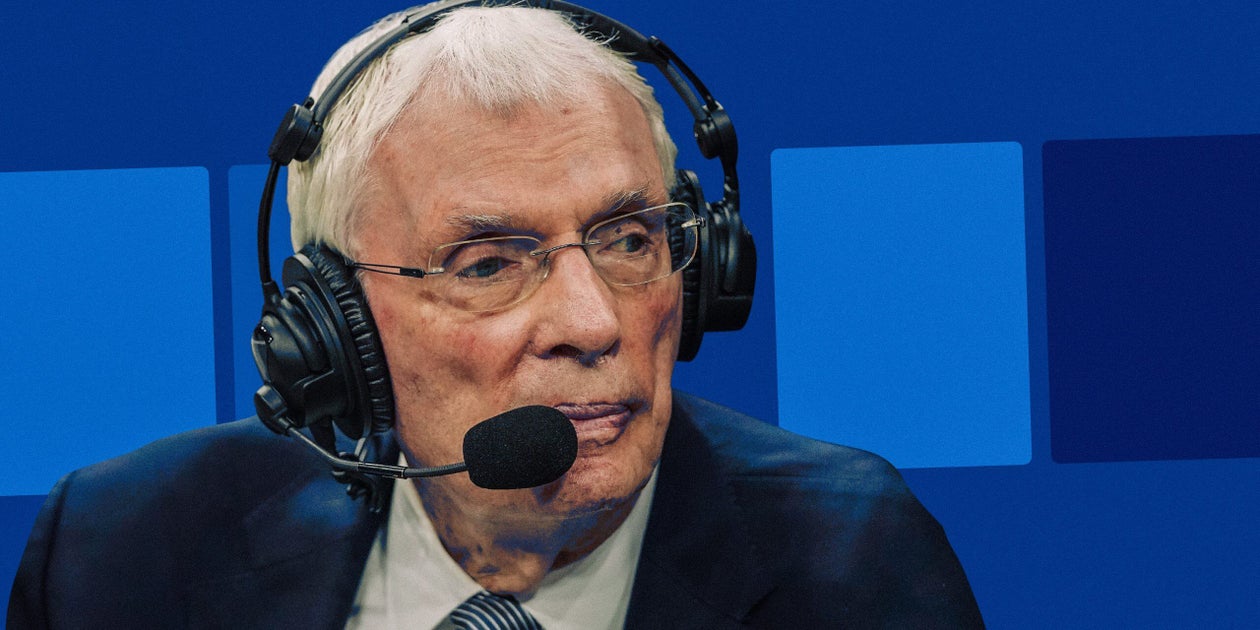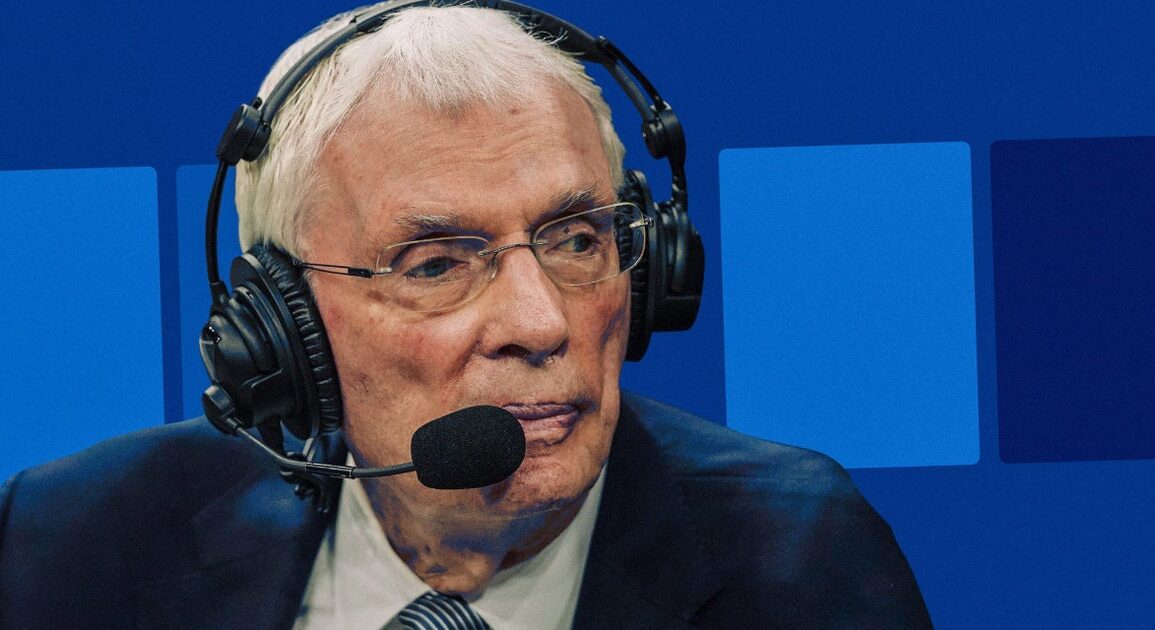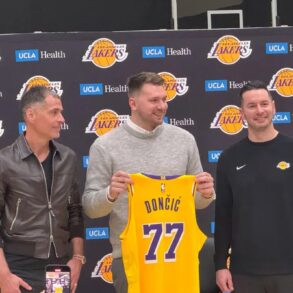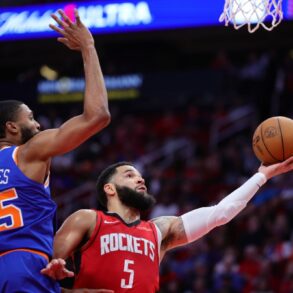
Hubie Brown is laughing. The 91-year-old NBA broadcaster very much enjoyed the question I just asked him:
“If I had interviewed you when you were 50 years old and told you that you would still be broadcasting NBA games in your 90s, what would you have told me?”
This is a man who coached Kareem and Oscar, coached against Kobe and LeBron, and called games featuring Walton and Wembanyama. His career has spanned A.I. (Allen Iverson) and A.I. (Artificial Intelligence), his voice a constant soundtrack of the NBA for multiple generations.
Advertisement
In a broadcast this Sunday that will celebrate his 50 years as an NBA coach and national television and radio analyst, Brown will call his final NBA game — Sixers at Bucks (2 p.m. ET on ABC).
Inducted into the Naismith Basketball Hall of Fame in 2005, Brown returns to Milwaukee, where he began his professional coaching career as an assistant coach for the Bucks in 1972. The broadcast is expected to feature plenty of tributes to Brown. Mike Breen, a fellow Basketball Hall of Fame commentator, will call the game alongside Brown. (The two called the 2006 NBA Finals on ABC together.)
“Guys say to me: ‘How do you feel when you get up? You’re 91 years old’,” Brown replied to my question. “I tell them I’ve never awakened any day and said, ‘Boy, I’m glad I’m 91!’ I’ve never given age a major thought because the business still wanted me to be part of their presentation. This is all humbling.
“When I look back, it’s been the fastest 50 years of being in the NBA as a coach and as a television person. On Sunday I want to be at the top of my game. You want to be able to do justice to the game itself, and then also for the players and coaches that are going to be in the game.”
Brown has been part of ESPN’s NBA coverage since joining the company in 2004. Prior to his ESPN role, he was an NBA broadcaster for CBS Sports and TNT Sports, as well as a renowned coach (including NBA head coaching roles with the Atlanta Hawks from 1976-1981, the New York Knicks from 1982-1987 and the Memphis Grizzlies from 2002-2004.)
One the remarkable things about Brown is that his mind is still sharp at 91. Is it at sharp as it was when he was 45? Probably not. But look at this answer, especially the detail, when asked about how he was going to approach his final broadcast:
“I always try to see both teams twice within seven days before I do the game,” Brown said. “That’s just to see who is starting, substitutions, the latest on who’s injured, who might be coming back et cetera.
Advertisement
“Then, naturally, the strategy, especially in the last five minutes on how the coaches will approach side out-of-bounds plays and under out-of-bounds plays.
“Then, once the action starts, whether they run under the pressure either offensively or defensively. The day before the game you always have the latest statistics on every facet of the game.
“This is a big game. When you say Philadelphia and Milwaukee, if you were talking before the season started, you’d say the two of them have a chance to challenge Boston. But because of the injuries, we have no idea who’s going to start for both teams. When we go on air, it’s going to be interesting.
“There’s a lot more for this game than me just saying goodbye.”
Brown said he hasn’t thought much about his professional future beyond Sunday’s game but appearing on podcasts or doing sports radio spots from time to time sounded interesting to him. Travel for sports broadcasters as they get older ultimately becomes the reason many pull back.
Brown has also had a devastating eight months, personally. His wife of 63 years, Claire Frances Brown, died last June 7. Then more tragedy — his son Brendan Brown, a former radio broadcaster for the Knicks, died at the age of 54 last November due to health complications.
“Losing Claire and then Brendan,” Brown said, his voice trembling. “It’s been a tough couple of months.”
Brown said he still tries to watch basketball every day but reduced his intake from previous years, given he is no longer working a full broadcast schedule. As he reflected on his broadcasting legacy, he acknowledged that his style was always more technical than others. He was not an entertainer but desired to be informative. His broadcasting philosophy, distilled at its simplest form: Never underestimate the IQ of the audience.
Advertisement
“You have to understand the difference between doing an analyst job on basketball versus baseball and football,” Brown explained.
“In football they have 20 seconds in between. Baseball, you have 20 seconds in between. If you are an analyst in those sports, you have a replay anytime you want the replay. So even if you miss the action, you get another second chance. You can talk all you want for 20 seconds. You can be funny.
“But in basketball, when that ball goes through the basket, you don’t have 20 seconds. If you have 20 seconds, there will be a basket at the other end and another basket back at the other end.
“I always tried to stay within five to eight seconds with my thoughts because once that ball goes through the basket, that announcer is going to give the score,” he continued. “I can’t be as witty because there is not much time. If I’m being witty, well, we’re going to miss the action. If you’re going to do the NBA at the speed they’re at, you have to be concise and not talk above the person.
“Whether it is a grammar school kid or an old-timer watching who’s been watching for 40 years, you want your terminology to be simple but recognizable. It has to be educational.”
Educator is really the best description of Brown. His broadcast were often lectures taught by the holder of a PhD in “the Painted Area.” His national broadcasting run ends this week, but his legacy and longevity is forever. We won’t see Hubie Brown’s kind in sports broadcasting anytime soon.
(Illustration: Dan Goldfarb / The Athletic; Mitchell Leff / Getty Images)
This post was originally published on this site be sure to check out more of their content.








